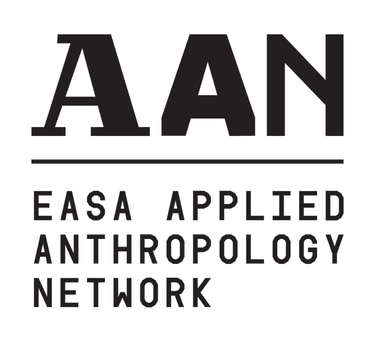
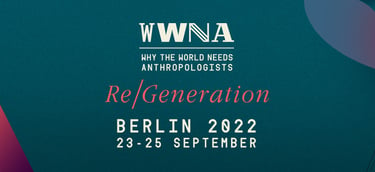
We are proud to announce the tenth annual hybrid (onsite and online) event
Why the World Needs Anthropologists:
Re/Generation
23-25 September 2022 in Berlin, Germany
A symposium that explores the different applications of anthropology beyond traditional academia. At the tenth edition, Re/Generation, we aim to create a collective movement to confront some of the most pressing and challenging global issues of our time.
OBSOLESCENCE | AUTOMATION | ECOLOGY | CONSUMPTION | GENERATIONS | RECOVERY | SUPPLY & DEMAND | DECAY | APPLIED RESEARCH | COLLABORATION
Looking back on the vicissitude of the global COVID-19 pandemic, we witnessed our institutions, communities, markets, health and social networks, and governments brought to their knees by either depletion of workforces or having their in-built corruptions highlighted and rallied against. In response, we will create a space of open conversation about the very nature of decay, recovery and regeneration.
We want to evaluate the planet’s ongoing recovery and its attempt to bring itself back from the brink and highlight how movements in this time of great strife enabled people to assert themselves, however successfully, against the structures and systems it took this adversity to reveal. We want to inspire action towards the social and environmental pitfalls of the cyclical economy: how it has engendered cultures of proliferation, overuse, and unfettered disposal. We want to invite discourse around the very nature of regrowth. There is a crucial need for anthropological thinking around the ever-present issue of how different generations co-exist: what assumptions are made on the basis of age that hinder us from unlocking progress towards a more just planet?
The goal is to center our discipline in the seismic decisions that are being made about our social, ecological and economical future within the domains of: automation, environmental decay, social and financial recovery, and temporalities. The goal is to give something back – our expertise and energy, to learn from each other and embark on new collaborative projects.
Re-Generation welcomes people from different backgrounds to share their stories, ideas and experiences.
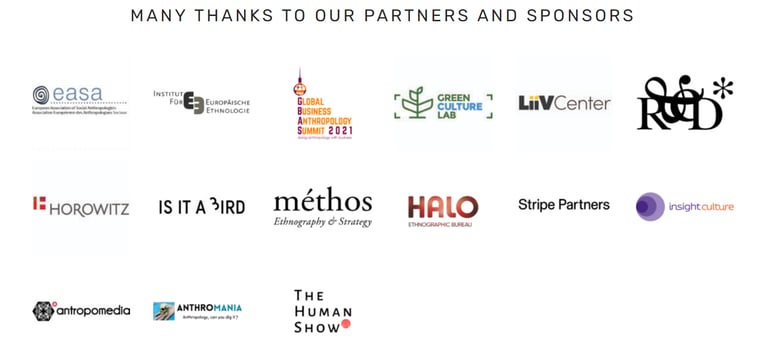

Speakers
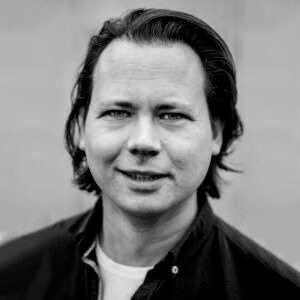

ANDERS KRISTIAN MUNK
Director of Techno-Anthropology Lab at the University of Aalborg


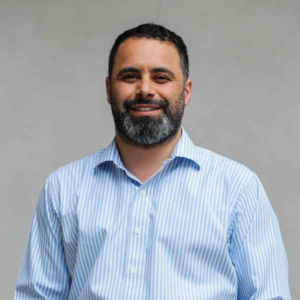

JUAN CARMACH
Project Officer of the Partnership for the Advancement of Digital Anthropology at UNESCO


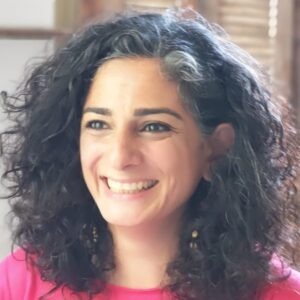



KATIA DUMONT
Regional Network Organizer, BMW Foundation Herbert Quandt
MUZNA AL-MASRI
Anthropologist, researcher, consultant & co-founder of Ebla Research Collective
PHILIPPE BIRKER
Researcher in Regenerative Agriculture
DAVID PRENDERGAST
Social anthropologist & professor at Maynooth University
The Applied Anthropology Network is proud to announce the programme for WWNA 2022: Re/Generation in Berlin, Germany. Day 1 will set out four exciting keynote talks on bold and engaging topics based on the strands of this year’s theme. Day 2 will see a day of WWNA staples, action and inspiration-focused Workshops and snappy, energetic Perspectives presentations. Day 3 will open with an exciting documentary screening, get hands-on with attendees around what they need for their applied work, and allow us to blow off some steam as we celebrate this the tenth edition of Why the World Needs Anthropologists.
Programme
Obsolescence – planned and unplanned – haunts our societies and the contemporary global moment. As traditional capitalist business models of product development and creation continue to fill the consumer markets with products and appliances that break weeks after their warranty ends, the landfills overflow with stuff that should be repaired and reused, but is instead discarded. Sustainability efforts at reduction and reuse seem increasingly insufficient in addressing challenges deeply rooted in cultures of wastefulness and mutually reinforced dominant paradigms, such as human-centricity, extraction, and linear growth – paradigms in need of reworking with reciprocity and kinship across systems and categories in mind. As environmental degradation persists, the entire planet is entering an ostensible end-game phase of obsolescence. “We cannot inherit!” seems to be the unspoken implication of the status quo. In part because a lot of what was taken for granted in the past will become unavailable in the future, and in part because there is what appears to be a revolt along generational lines with youth leading the way for an activist refusal to inherit. In an as yet pandemic reality, coronavirus has forced to the fore the threat of the obsolescence of business-as-usual logics permeating the world of business, innovation, policy, and organizations in every sector, and has exposed how unprepared they are for the uncertainties on an unsettled world. Thirdly, as big data and algorithms seem to dominate the methods of the hour, ethnography as an embodied form of inquiry itself seems to be in danger of becoming obsolete. Why would the world need anthropologists indeed in these times of damage and decay, dystopia and despair, death and digitization?
Furthermore and newly, global talking points inevitably move on; coronavirus gives way to the war in Ukraine, women’s bodily autonomy and civil rights of ethnic minorities in the West continue to be slashed across Euro-America. It has opened the world’s eyes to the complex nature of how force can bring large, stable nations and communities to their knees. It has also opened fault-lines exposing the contradictions of how people, communities, organizations and entire continents treat violence and conflict. Countries in the global south which have suffered insurmountable pillaging and intervention from bullish forces look on with dignified solidarity at countries and communities in the north encountering what they have for, in some cases, decades. From the speed of physical mobilization of people to volunteer their efforts, to diplomatic mobilization of leaders to share resources, and digital and creative mobilization of actors to use the internet and culture to bolster solidarity and raise money for causes, this year should serve as an example of how anthropologists can turn their efforts to appraising the global approach to violence with a view towards parity.
Anthropology is a discipline like no other in tackling problems precisely due to our tolerance and understanding of complexity and emergence and our ability to see things from different angles and in various perspectives. Applying anthropology to such problems rearranges the terms in which they are operationalized – and therefore solved. In that, applied anthropologists have always been as shrewd consultants of change as they have been passionate activists for change.
Generational assumptions and logic permeate most building blocks of our contemporary understanding of phenomena as varied as consumption patterns and climate change. In business and in life, we make sense of phenomena in terms of their cycles, permanence, recurrences and discontinuations. In cohort thinking, these understandings are reinforced – we are influenced by our peers, people who share similar experiences in space and time.
Generational thinking is everywhere: from the perpetual drive of business to push “the next generation technology” – thus fuelling cultures of obsolescence – to an incessant buzz around how Gen Z drives forward the sustainability transformation of companies, from luxury brands to humble everyday products; from an ever louder critique of boomers being complicit – through overspending and overconsumption – in coming economic and environmental dystopias, to the ubiquity of “digital natives” as the meta-generation of all those who grew up with software as general purpose technology. Regularly operationalized so it can lend itself to marketing segmentation, yet notoriously hard to define, in the great churn that is culture generation becomes a convention and stereotype with broadly adopted yet volatile cultural currency (really, what is the fundamental difference between someone born in the last year of Gen X, and someone born in the first year of Gen Y and will that fundamentally impact their purchasing habits?).
In popular media, commentators argue the concept must be done away with. Futurists implore us to aspire to be better ancestors. Economists note with alarm the knock-on effect that living with one’s parents until 40, itself oft-blamed on the delinquencies of neoliberal economic systems, is hurting the economy. As more and more people from generations Y and Z are foregoing biological reproduction, or rearranging indeed the terms of creating a family, demographers are at a loss how to predict fertility rates and what to advise on people issues on the fast depleting lower half of population pyramids of OECD countries. This has wide-ranging implications – from what that means in human resources and the meanings of age-appropriate career tracks, to how it changes the patterns of consumption and how that is represented and sold in marketing and advertising.
What is more, generation is enmeshed with questions of sustainability, circularity, and environment. That we are fast running out of alphabet to designate the generations to come seems to carry with itself some sort of almost appropriate existential nihilism, arguably suited for a world damaged in both planetary and social terms. What will come after Z, given environmental degradation? Threaded through the riff of generation as a condition for life, policy, and business is that of ecology and environment, as evident in growing movements such as “Fridays for the Future” and “Parents for the Future.” It is more and more evident that humans have never been kin only with their own bloodlines within their own species and their historical cohorts, but also with non-human actors and living systems.
Generation (as an index and measure of human capital and social and cultural change, and as a denominator of shared experiences, rather than a simplistic age-based segmentation) and regeneration (as process of circling back and making use of the old in creating the new) – are about the non-linearity and the more-than-human-centricity of relations. It’s about the uses of the old in innovation and design, and a fundamental rework of commonly held ideas about the shapes, meanings, and materializations of both innovation and progress.
Re/generation, then, is about the links and cycles that beg the operationalisation of an expanded notion of kinship and ecosystems; of heritability, consequences and responsibility; of repair and reinvention; and of rehabilitation and sufficiency in the various sectors whose attention it has already attracted – from agriculture, textiles, and tech to finance, architecture, and healthcare.
This year’s WWNA wants to capture these re/generational entanglements as an inspiration and to join the conversation already underway in these sectors. We want to draw on anthropology’s depth and breadth of theoretical and ethnographic knowledge about relations, kinship, time, capital, and materialities, and to demonstrate that applying this breadth and depth to various domains has a direct material import and practical impact to business, think tanks, organizations, and ecosystems – in helping solving their problems and in making the world a better place.
How do stakeholders (communities, businesses, government, activists) currently approach re/generation, and how might an anthropologist usefully intervene? What new knowledge would be created in the process, and what actions and decisions would follow on? In what ways does re/generation offer an opportunity to decolonize our current mindsets and models about kinship, lifecycles and relationships between humans and the environment, and systems of value creation and value exchange? What is the business and social case for that? Even most urgently, how do these conversations play out against the unfolding backdrop on the pandemic and post-pandemic world, from which individuals, businesses, communities, and organizations are emerging?
The conference will run on FOUR tracks, no longer just the three. Below is a non-exhaustive list of questions of interest. Additional takes on the sub-themes of each track are welcome.
GENERATION
How do we bring anthropological sensibility to questions of building products, services, and infrastructures for generations, and for intergenerational justice? What are the business cases for that, and how do such business models and cases challenge capitalism to change? How does anthropology help bridge generational divides, and through what form, formats, and interventions? What changes in cultural assumptions about age, ageing, and longevity are both present already – and must be championed further – for the creation of inclusive and diverse organizations, business, and generation-sensitive products, services, and technologies? What does heritage mean in this context? How – and what – do we build with generations in mind and together with generations? What new technologies enable this? How does generational thinking affect the way new technologies, services, products, and policies are developed and deployed?
REGENERATION
How do we help build regenerative cultures, infrastructures, business models, supply chains? How do anthropological concepts, theories, and ethnographic methods lend themselves to regeneration by design, and what does regenerative design mean seen in anthropological lens? From recycling and up-cycling to cradle-to-cradle logics of design and material culture – how does applied anthropology engage with existing understandings about regeneration in various sectors? What is the role of both historical and future thinking in regenerative paradigms?
REGENERATING ANTHROPOLOGY
How do we regenerate our beloved discipline – what is the need for renewal, and what is the need for perhaps even bringing back from the past? How do we build intergenerational kinship in anthropology – between generations which measure anthropology’s worth in reading and writing on the tenure track, and those generations for whom an applied anthropological career will be the call of a lifetime of reading and acting? How do we innovate in anthropology, and how do we regenerate our own methods and theories? How do new technologies – digital and otherwise – open up spaces for anthropology to claim its place at the table from which we have been missing? What does regenerative anthropology look like?
POST-CONFLICT REGENERATION
How do we – and should we indeed – avoid mirroring the often interventionist approaches that cause and exacerbate conflicts the world over? How can we combat a deeply orientalist prioritisation of conflicts? What can volunteers reasonably do under dangerous circumstances? How useful can charities and organisations be parachuting into recently razed areas? When is a war ever over? What can we learn from the wealth of postcolonial analysis now that war has reached Europe’s shores again? Can local, grassroots approaches to regeneration be applied to the national situation and vice versa? In what ways can the anthropology of war be instrumental in shaping peace-first diplomacy?
Theme
Do I have to be vaccinated to attend the event?
Yes. Please note that either 2G or 3G rule will apply, in accordance with local health and federal authorities in Berlin. Check back on our website for latest information closer to the event.
What´s a 2G/3G – is it the same as 5G?!
Nope! Here is some local terminology for you – the G is for the German words “Geimpft” (vaccinated), “Getestet” (tested), “Genesen” (recovered).
Can I buy a physical ticket but attend only online if my travel is impeded last minute?
Yes, but please note that in this case, your physical ticket will NOT be reimbursed.
What counts as “last minute”?
No later than September 9, 2022. Please do be aware that tickets are very limited, and there will likely be a waiting list. Please be kind to those waiting to join onsite if you cannot make it, and let us know as early as possible.
What if you have to cancel the physical event and move it all online due to corona?
In this highly unlikely event, all physical tickets will be converted to digital ones and the prorated difference in price will be reimbursed to physical ticket holders.
Do I need a travel insurance?
We do not require it but very, very, very strongly recommend it, given new variants emerging in Europe and present in Germany.
I have accessibility concerns, who should I talk to?
We will be working to make the conference as accessible and friendly as possible. Please contact our Accessibility coordinator Allura Warden by emailing wwna_support@applied-anthropology.com and write “WWNA22 Accessibility” in the subject line.
Can I bring my child?
Yes. We are child friendly, and it is an intergenerational conference after all. But please give us a heads up because depending on how old the child is, we may have to count it as an adult in terms of physical occupancy. Be advised: if you bring your child, we will attempt to make sure it becomes an anthropologist later in life. It’s the best future for anyone.
Can I bring my parents?
We would love love love to include your parents – the parents of anthropologists are even cooler than anthropologists themselves. Physical capacity however sadly means we can only accommodate them virtually.
Will you add stuff about airport transfer, currency, local transportation and things like that?
Yes. Please check back closer to the date and on our social media. The minimum viable guide to Berlin is currently being prepared.
What is the meaning of life?
For this, and all other questions that might crop up leading to the event, please email wwna_support@applied-anthropology.com
